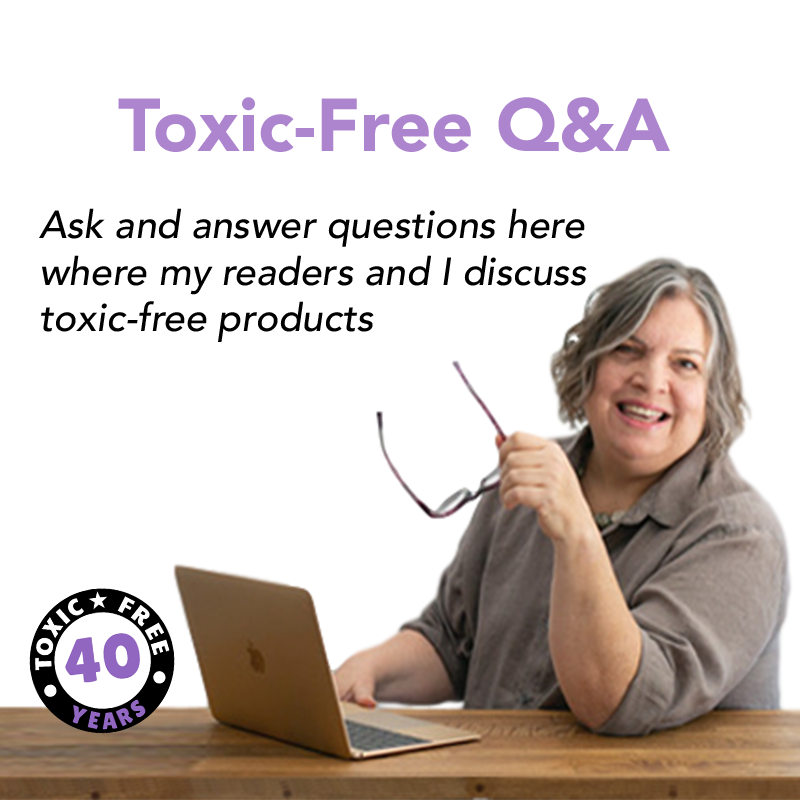
Submitted questions will be posted with my response by the following Tuesday or before.
Submitted comments will be moderated and approved within 24 hours.
Bladder infection
Question from Barbara
Is there a natural product to help relieve a bladder infection? I don’t want to take a prescription med. because I’ve been getting them frequently.
Debra’s Answer
Try cranberry juice. Readers, any other suggestions that have worked for you?
How long to avoid new paint?
Question from Katie
I am chemically sensitive and still getting used to what causes reactions, etc.
I’m wondering how long paint off-gasses, and for what length of time it is recommended for a chemically-sensitive individual to avoid a building or room which has been recently painted? Thank you!
Debra’s Answer
It really depends very much on the type of paint used and the degree of sensitivity of the individual.
Water-based low-VOC paints will usually dry within a couple of days. The warmer the weather and the dryer the air, the faster the paint will dry. Closing up a room with a space heater inside will make it dry faster.
That said, some people with MCS report still reacting to paint after a year.
No more objections to stevia by FDA
The news today is that the U.S. Food and Drug Administration (FDA) has no objection to the findings of an independent expert panel concluded that rebaudioside A (rebiana), the sweet component of stevia, is generally recognized as safe (GRAS) for use as a general purpose sweetener. This means that stevia can now be used in food products.
The first stevia product I’ve seen advertised is Truvia. It has been available in limited distribution since July of this year, but is now being advertised on television. Truvia will also be a sweetener used in processed food products.
Though this product has some advertising that wants to lead you to think it is natural, it is natural only in the sense that it comes from plants–it is highly processed, and not pure stevia. The first ingredient is eurythritol, then rebiana extracted from stevia, plus natural flavors.
Eurythritol don’t occur in nature in any appreciable amount that can be collected. There is no eurythritol hive or tree or plant. The amount that nature has provided in fruits and vegetables is miniscule, and in the context of lots of water and fiber in other nutrients. Though eurythritol is made through a natural fermentation process, it is a manufactured product–you can’t go collect eurythritol in nature somewhere and use it as a sweetener.
So what we have here is a combination of two substances that occur in nature in miniscule amounts (along with water and fiber and other co-factors), extracted and concentrated into a sweetener (with no water and fiber and other co-factors).
Stevia and eurythritol are perfectly fine to ingest in their natural context, but I would rather eat whole foods as nature intended, rather than concentrated extracts.
I do eat stevia. I pick the leaves from a pot of stevia plants outside my kitchen door and munch on them. I steep it along with other herbs to make sweet tea. But I personally am not going to put extracts concentrated by industrial processes in my body when there are many naturally sweet foods to enjoy.
Low Mercury Tuna??
Question from MLS
I’m confused about tuna; I downloaded a fish guide to help choose fish caught in an environmentally friendly manner, but also contain the least amount of mercury. There is ‘tuna’ listed in all three categories – worst choices, OK choices, and best choices. Tuna, albacore (Canada, U.S.) was listed in best, as was Tuna, skipjack (pole/troll) and Tuna, yellowfin (U.S. pole/troll). Is there a way to tell or find out what ‘tuna’s’ would fall under this category? So far the best I’ve been able to distinguish (and can’t always) is whether it is albacore or skipjack tuna. Any ideas on how to find out where and how it was caught, thus ensuring the lowest mercury count possible – or do I need to just give up on tuna altogether?
Debra’s Answer
Good question!
Personally, I don’t eat tuna at all, so, readers, what is your experience with this?
Helium Balloons
Question from Amy L
Hi Debra,
Is there a health concern related to helium baloons? Is helium safe to be around/breath in when a helium baloon pops?
Thanks!
Debra’s Answer
There’s a page about helium at http://www.lenntech.com/periodic-chart-elements/he-en.htm which says the following:
The amount of helium that you would be exposed to from a balloon popping would be insignificant.
Whole milk vs. fat free/skim
Question from MLS
I heard recently that IF we are going to drink cow’s milk, it is better to drink whole, despite the higher fat, as it is ‘less processed’ than fat free. Is there really much processing between the whole and fat free stage? Or is most the harmful processing done at the pasturization level?
Also, I heard that adding straight colostrum (which you CAN buy in Oregon) will help add back some of what was lost during pasturization.
Any thoughts???
Debra’s Answer
It’s not the processing itself that is harmful, but the end result.
The reason to drink full fat instead of fat-free milk is two-fold: the fat contains valuable nutrients, and it’s important to eat the whole food as nature intended. When we eat foods from which parts have been removed, we miss vital pieces.
Pasturization destroys enzymes that aid in digestion as well as some vitamins.
Adding colostrum will help add back some of what was lost in pasturization, but it’s better to drink the whole milk in it’s original form rather than piece together parts.
Back in the days when milk was sold whole and raw, it was considered a health food and used recommended by doctors.
Chloramine Shower Filters
Question from Mary
There was an earlier post about Aquasmart Tecnologies having a shower filter that filters out chloramines. I called the company and they make the Kdf filters that they sell on their website they have two types of shower filters, the Kdf 55 which filters out chlorine and they have a new filter the KDF 85. The Kdf media exchanges electrons with contaminants; removing 95% of chlorine, most heavy metals and an average chloramines reduction of 85 % for 10, 000 gallons at a flow rate of 2.5 g.p.m. I got this information off there web sight, but when I talked to a representative of the company she assured me the filter removed chloramines and explained how.
I have used their filter for almost a year and noticed a difference. A friend used our shower and said his skin wasn’t as dry and itchy as when he showers at home.
Debra’s Answer
Non Toxic Flame Retardants
Question from janet johnson
I work in a small preschool, and have just learned that we must use only flame retardant fabrics in our classrooms: window curtains, play cloths, house building fabric lengths, etc. We want to use natural fibers only (our window curtains are silk dyed by hand with plant-dyes) and are looking for non-toxic treatments that will not endanger our children, ourselves and our environment. Any suggestions?
Debra’s Answer
National Fireproofing sells “nontoxic” flame retardants that can be applied to all types of fabrics. I’ve never used their products and there are no ingredients lists…if you try it, let us know.
Nuwave Oven
Question from Deb Rose Hayes
I was looking into buying a nuwave oven for my cooking classes and home use for the time and energy savings, and found that the dome is made from polycarbonate containing BPA.Would this leach out into the food or into the air during use?
Debra’s Answer
I don’t know the answer to this. I know it will leach into food. My best guess is that it might because heat causes things to be released from plastic. But I don’t know of any studies on this.
Readers?
Healthy auxiliary heating
Question from Betty L
We have central heat, electric, but want a healthy heating option for when the electricity goes out. We have what I thought was a good wood heating stove from 15 years ago, but I noticed that it bothered me. Used it only a few times. But now I have Reactive Airway Disease, or the next thing to Asthma, my doc said.
What kind of heat could we do in an emergency, that is not so toxic? Looked into pellet stoves, but they seemed to need electric for the fans and circuitry. And propane also seemed to be so toxic. Are there any really tight wood stoves, or propane stoves or what, that would not be a problem to someone with very sensitive breathing problems??
Thanks
Betty
Debra’s Answer
Readers?







